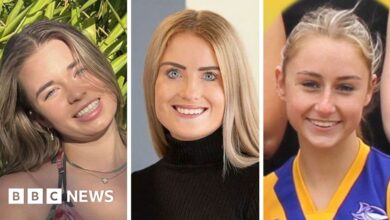Who was behind one of the deadliest attacks of the conflict?
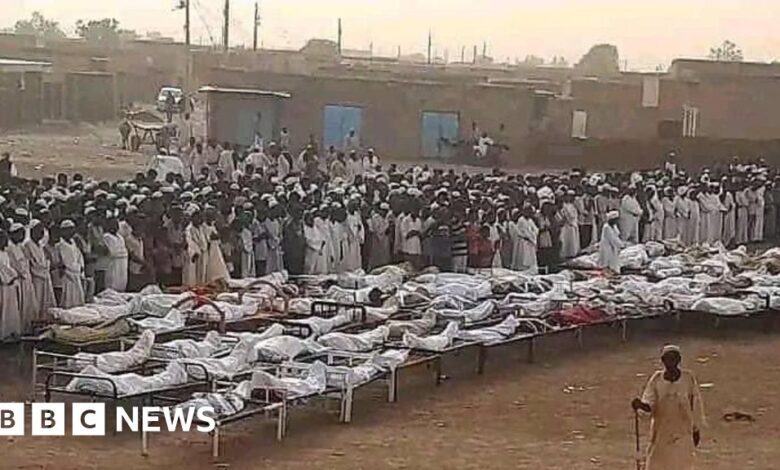
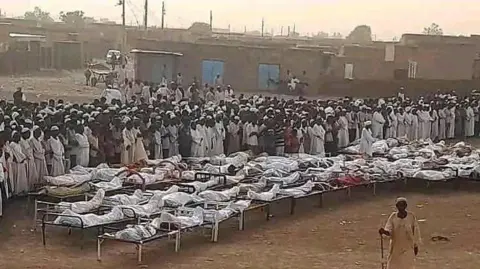 X
XWarning: This article contains details that may be disturbing to some readers.
For 40-year-old farmer Ali Ibrahim, the nightmare began late in the afternoon of June 5, when heavy gunfire was heard.
“We had never seen such shelling since we were children,” he recalled. “The bombing lasted for four hours, destroying many houses, children were screaming – women and old people could not escape.”
According to estimates from volunteers from the local resistance committee, at least 100 civilians were killed that day in the attack on the Sudanese village of Wad al-Nourah.
The villagers were unarmed, Mr Ibrahim said: “We are ordinary farmers. We have never carried weapons. We have no enemies. We are just citizens trying to protect our lives.”
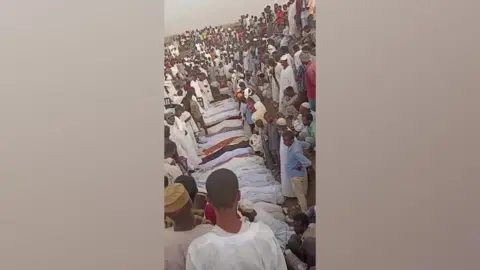 X
XThe BBC has heard testimony from several survivors who say armed men from the Rapid Support Forces (RSF) – a paramilitary group fighting the Sudanese army – opened fire and stormed the village in two successive attacks, using heavy weapons. Dozens of residents were killed or injured.
The death toll is believed to have been one of the deadliest civilian incidents since fighting between the army and RSF began in April 2023.
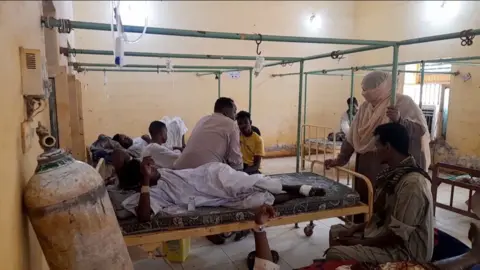
The BBC has been able to speak to a number of survivors of the Wad al-Nourah attack, who are now being treated at Al Managil government hospital, where they were transferred for treatment.
Reporters can also analyze the videos they share.
The hospital is about 80km (50 miles) from the village, and many survivors arrived there hours after the attack. According to their testimony, RSF forces also tried to prevent them from leaving the village and confiscated most of their vehicles.
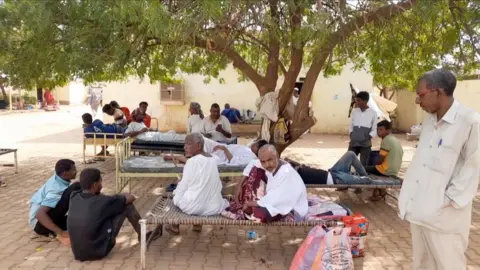
After enduring “hours of terror” during the shelling, followed by frantic efforts to find a way to evacuate the wounded and bury those killed in the shelling, residents were “shocked” when the RSF launched a massive attack on their village early the next morning, one of the survivors at the hospital told the BBC.
“They came into my house, beat me and my siblings and asked ‘where is the gold?’. My sister was scared and told my mother to give them the gold.”
This account is consistent with that of other survivors, all of whom confirmed that RSF forces “attacked the village from three directions, storming houses, killing civilians and looting valuables, including gold, cars and stored agricultural products”.
‘They killed my brother’
Hamad Suleiman, a 42-year-old retail trader, said armed RSF fighters stormed his brother’s house and started shooting without warning.
“I went to my brother’s house and found them there… They shot my brother and nephew, another nephew was injured and is here with me in the hospital.”
He said he tried to reason with the RSF fighters and asked why they had killed his family.
“I tried talking to them, and they told me to read the Shahada [The Islamic profession of faith that is recited when the feeling of death is near]They shot me in the arm and ran away… they stole all the cars.
“I was injured and couldn’t find my way out for hours.”
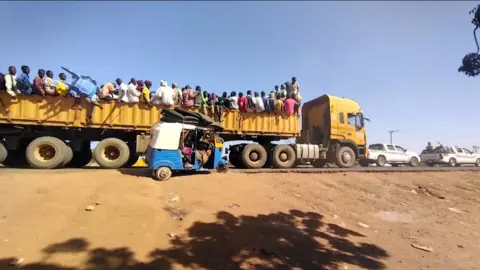
The BBC contacted RSF for their response to the survivors’ accounts, and the allegations of attacks, killings, looting and intimidation. We had not received a response by the time of publication.
RSF spokesman Al-Fateh Qurashi issued a video statement on X, formerly known as Twitter, a day after the incident – denying their forces had targeted civilians.
He claimed that the force engaged elements of the Sudan Armed Forces (SAF) and Intelligence Service – also known as ‘Al Mustanfaron’ – a militia carrying small arms and affiliated with the SAF, who were present in the village at the time of the attack.
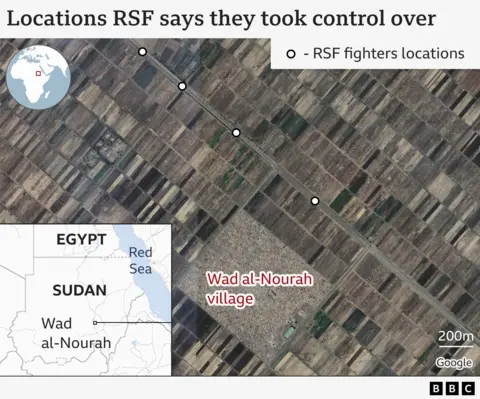
The BBC Fact Check team analysed videos provided by RSF, which they claim show sites and trenches used by Al Mustanfaron in Wad al-Nourah. The analysis found that all of these sites were located outside the village, not inside it.
Analysis also showed that RSF members opened fire on the village with heavy weapons from a distance of about a mile.
Wad al-Nourah is like hundreds of villages scattered across Gezira state. Most of the residents are farmers and traders, and there is a small weekly market where traders from neighboring villages come to buy and sell livestock and crops.
RSF took control of Gezira canton, located south of the capital Khartoum, in December 2023 and has been accused of carrying out numerous abuses against civilians there – something RSF has consistently denied.
Gezira State was one of the areas worst affected by the war, with fighting spreading there from the beginning of the conflict. It also became a refuge for thousands of displaced people fleeing Khartoum and Darfur.
Since the RSF took control of the area late last year, village after village has been hit by successive acts of violence.
RSF continues to deny allegations of war crimes such as murder, looting, rape and the burning of villages – instead blaming what it calls “disobedient” people.
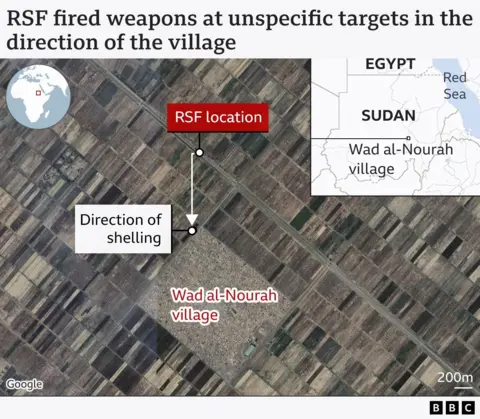
Thousands of people have died and 10 million have been forced to flee their homes since April last year, when Sudan descended into chaos after the army and a powerful paramilitary group began a fierce power struggle.
The UN Resident and Humanitarian Coordinator in Sudan, Clementine Nkweta-Salami, has called for a comprehensive and transparent investigation to shed light on the circumstances of the Wad al-Nourah attack.
Villagers, who have lost dozens of loved ones, hope a commission of inquiry will be set up and the perpetrators held accountable – rather than escaping punishment as has happened in Sudan in the past.
Additional reporting by Abdelrahman Abutaleb and Richard Irvine-Brown


